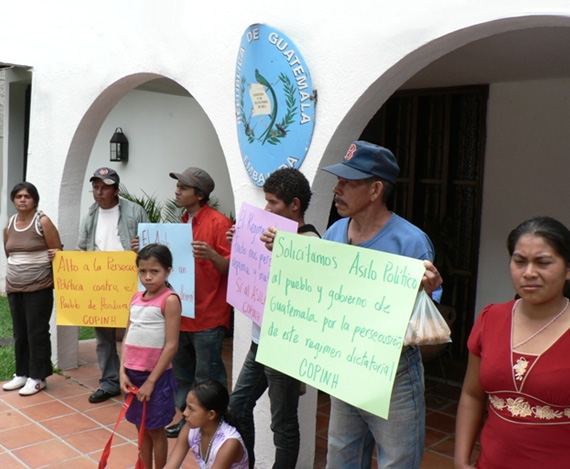|
Expectations grow with
the arrival of the OAS mission of foreign ministers and the initiation of a
dialogue, however contradictory and uncertain its contents may be. Meanwhile,
the victims of the more than 100-day-long repression step up their struggle,
following the lifting of the state of siege.
Proceedings
against 51 of the 55 people arrested at the National Agricultural Institute (INA)
began early on Oct. 6, at the hearing room of the Supreme Court in Tegucigalpa.
The defendants, members of Honduras’ three leading peasant
confederations, were taken into custody in a joint police-army raid of the
INA facilities, following a peaceful three-month occupation by workers.
Thirty-eight
people were charged with acts of sedition against the security of the State and
held over a week in jail, staging a hunger strike after they declared themselves
political prisoners, while precautionary measures were issued against the
remaining 13 (five women, six elderly men and two minors).
The judge that
issued the precautionary measures also freed four INA workers, members of
the National Agricultural Institute Workers’ Union (SITRAINA), an IUF
affiliate.
According to
the defense attorneys of the 51 people arrested there are sufficient grounds to
have their cases dismissed and have them released. However, they fear that the
de facto government will continue with repressive actions to break up the
Resistance movement against the coup.
Dozens of
people arrived at the Supreme Court with signs and banners, chanting slogans to
express their unconditional support, as the defendants made their way slowly
into the courtroom.
“SITRAINA
is not backing down,” Luis Santos Madrid, general secretary of the union,
told Sirel. “We’ll keep on resisting.”
“We’re not
going to recognize the new authorities imposed by the de facto government, so
we’re making signs and banners to make our situation known.
“As long as our
fellow workers are in jail, we’re not going to negotiate with the de facto
minister. We’re here today to support the struggle of these people who have been
unjustly arrested, and the four SITRAINA members who were declared
innocent will testify to get the charges thrown out,” Luis Santos Madrid
said.
“We’re going to
keep on fighting until they’re all set free and constitutional order is restored
in the country,” he concluded.
In an official press release, President Manuel Zelaya demanded on
Tuesday, Oct. 6, that the de facto government “immediately release its political
prisoners, stop repressing the people who are resisting, and reopen Radio
Globo and (TV channel) Canal 36, as these actions were
conducted under an illegal
decree and are
violating the rights and liberties of the people and the media, who are engaged
in the resistance.”
Political asylum for persecuted indigenous people
Twelve members of the Civic Council of Popular and Indigenous Organizations of
Honduras (COPINH), including four minors, came into the Guatemalan
Embassy in Tegucigalpa yesterday to request political asylum, claiming they are
victims of political persecution by the current de facto government.
The asylum-seekers - Lenca Indians from the department of
Itinbucá, in
western Honduras - denounced that they are victims of persecution,
torture and repression as a result of the coup, because of their active
involvement in the mobilizations organized by the
National Front Against the Coup.
According to COPINH leader Salvador Zúniga, “We’re seeing people
turning up dead, hundreds others arrested, and today there are more than 60
people in jail, and there are even summary executions. The situation is
alarming.”
Of the people who sought asylum in the Guatemalan Embassy, four have
already been in jail and one of them has recent bruises on his face and head, as
well as signs of torture and beatings. We are facing a terrible, deadly regime,”
Zúniga explained.
Shortly after receiving the asylum request, the Guatemalan embassy issued
a communication stating that “under article 27 of its Constitution, Guatemala
recognizes the right of asylum and grants it in accordance with international
practices,” and announce that its foreign minister, Haroldo Rodas Melgar,
was participating in the OAS delegation “to help set up a negotiating
table towards seeking a solution for the political crisis in Honduras.”
The press release also demanded that “the de facto authorities fully respect
human rights and cease the acts of repression against their citizens.” Within
the next few days the Guatemalan government will announce whether or not it will
grant asylum to the COPINH members.
OAS mission arrives
A high-level
OAS committed arrived on the morning of Oct. 7, formed by the foreign
ministers of Costa Rica, Ecuador, Guatemala, El Salvador,
Mexico, Panama, Canada and Jamaica, and by the
Argentine and Brazilian OAS ambassadors.
The commission
will also be joined by OAS Secretary-General José Miguel Insulza,
the Spanish Secretary of State for Iberian-America,
Juan Pablo de
la Iglesia, and an envoy of UN Secretary-General
Ban Ki-moon.
The aim of the
mission will be to promote a dialogue. The National Front Against the Coup
has been invited by President Manuel Zelaya to participate in the
dialogue, but at the time of publication, it had not yet decided whether it will
be accepting.
 |